When I wrote The Scribbler’s Guide to the Land of Myth, I dealt with sidekicks as an aspect of the Trickster. Some of the discussions of the Child/Parent relationship affect sibling relations. And certainly the Band of Companions will also involve the interactions and relationships of the members of the group. But until recently, I had not really looked at the distinction between sibling relationships and buddy relations. But recently, a couple of television shows have gotten me thinking.
When the new version of Hawaii Five-O began airing, the relationship between the new McGarrett and Danny Williams is clearly set up as boss and subordinate. McGarrett is the head of the new team and gives the orders. Danny is a police detective who is transfered (initially unwillingly) into McGarrett’s new unit. McGarrett’s authority is established early in the pilot. This is a fairly typical situation for a hero and sidekick combo.
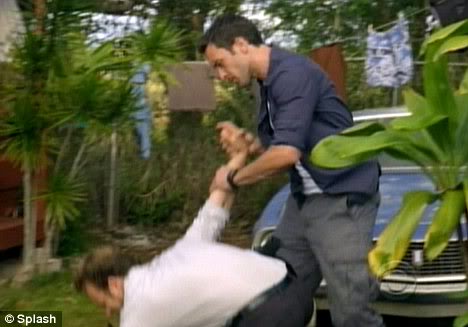 But the show has very quickly also established that outside matter of the chain-of-command, McGarrett and Danny interact as peers, as buddies. There is an equality to their personal interactions that would never be seen between siblings.
But the show has very quickly also established that outside matter of the chain-of-command, McGarrett and Danny interact as peers, as buddies. There is an equality to their personal interactions that would never be seen between siblings.
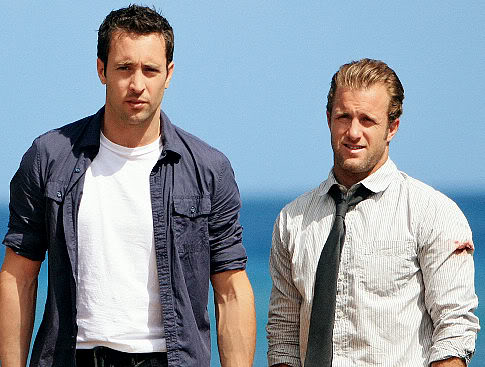 A sibling relationship, on the other hand, very rarely includes an inherent equality. I want to make it clear that there is a difference between unity in sibling relationships (“me and mine against the world”) and equality. About the only sibling relationship that might achieve equality is that of twins (and even there, one might be more a leader than the other). Siblings have a pecking order of authority, usually based on age, with eldest having the greatest freedom in how he or she treats others. Now, in storytelling, not all sibling relationships spring from actual blood or adoptive family connections. Sometimes it is just in the way two characters interact.
A sibling relationship, on the other hand, very rarely includes an inherent equality. I want to make it clear that there is a difference between unity in sibling relationships (“me and mine against the world”) and equality. About the only sibling relationship that might achieve equality is that of twins (and even there, one might be more a leader than the other). Siblings have a pecking order of authority, usually based on age, with eldest having the greatest freedom in how he or she treats others. Now, in storytelling, not all sibling relationships spring from actual blood or adoptive family connections. Sometimes it is just in the way two characters interact.
An example of a non-familial sibling relationship is that of Dr. Smith and Will Robinson on the classic show Lost in Space.
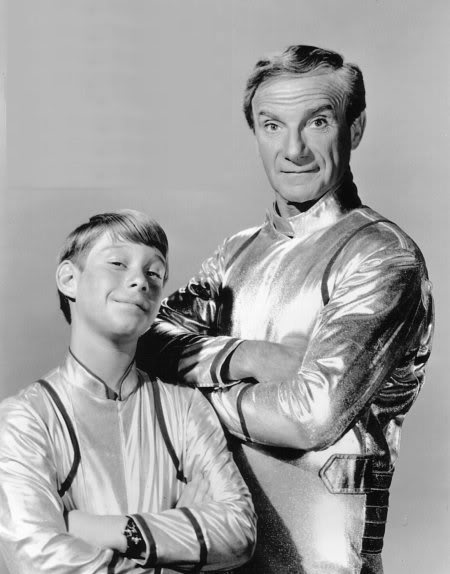 But don’t jump to the assumption that I am designating Dr. Smith as Elder Sibling in that relationship. I am not. Although Elder Siblings do have “abuse” privildeges over their youngers (and Dr. Smith was certainly abusive of the trust and freedom he was given by the Robinsons), they also have a sort of oversight of the behavior of the junior sibs. And on Lost in Space, it was Will who was doing the correcting and repairing needed because of the actions of “Younger Sib” Dr. Smith.
But don’t jump to the assumption that I am designating Dr. Smith as Elder Sibling in that relationship. I am not. Although Elder Siblings do have “abuse” privildeges over their youngers (and Dr. Smith was certainly abusive of the trust and freedom he was given by the Robinsons), they also have a sort of oversight of the behavior of the junior sibs. And on Lost in Space, it was Will who was doing the correcting and repairing needed because of the actions of “Younger Sib” Dr. Smith.
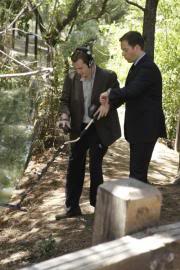 interesting way of tracking the distinction between sibling behavior and buddy behavior is the relationship of Timothy McGee and Tony DiNozzo on NCIS. In the early seasons, Tim was very much a probie in all ways, new to field investigations, new to the team, young, and very wet behind the ears. And Tony treated him always as a clueless kid brother.
interesting way of tracking the distinction between sibling behavior and buddy behavior is the relationship of Timothy McGee and Tony DiNozzo on NCIS. In the early seasons, Tim was very much a probie in all ways, new to field investigations, new to the team, young, and very wet behind the ears. And Tony treated him always as a clueless kid brother.
But by the sixth or seventh year, it was much harder to maintain that presentation of Tim’s character. He’s had experience, he’s taken the lead on some investigations, he “knows his stuff.” So things had to change. The very interesting choice is to have Tim’s attitude change. Tony still treats Tim as a Younger Sibling, taking advantage of the pecking order and “abuse” priviledges. But Tim responds as a buddy and starts to give back as good as he gets. (This is behavior that their “father figure,” Gibbs, approves, by the way.) Tim has decided to behave as Tony’s equal. Much humor is now found in the incongruity of Tony’s treatment of Tim and Tim’s refusal to play the Younger Sib role any longer.
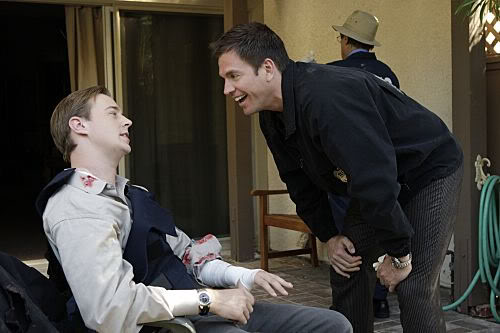 All of this discussion has been setting the stage for me to be able to say that in USA’s White Collar, the relationship between FBI Agent Peter Burke and con-man/forger/thief Neal Caffrey is not that of buddies: it is that of siblings. Against his preference, Peter gets concerned about Neal’s actions the way an older brother worries about his wayward kid brother.
All of this discussion has been setting the stage for me to be able to say that in USA’s White Collar, the relationship between FBI Agent Peter Burke and con-man/forger/thief Neal Caffrey is not that of buddies: it is that of siblings. Against his preference, Peter gets concerned about Neal’s actions the way an older brother worries about his wayward kid brother.
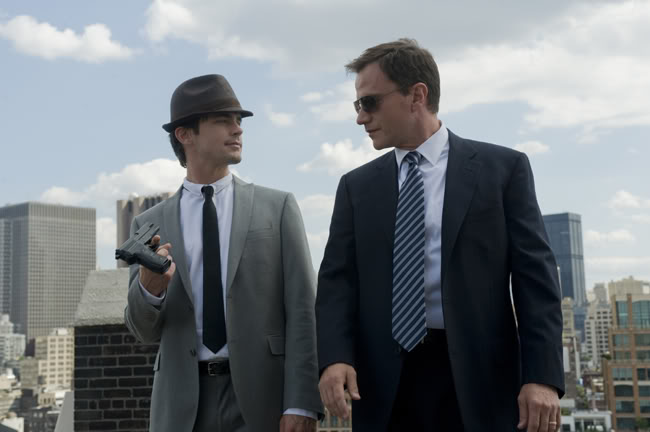 But Neal also responds to Peter with the loyalty and affection of a younger brother toward an elder he admires, respects – and fears (just a little). He respects Peter, saying he has never lied to Peter (although, con-artist that he is, he has allowed Peter to make incorrect conclusions about things without correcting him). He knows Peter has the ability to persuade him out of a course of action.
But Neal also responds to Peter with the loyalty and affection of a younger brother toward an elder he admires, respects – and fears (just a little). He respects Peter, saying he has never lied to Peter (although, con-artist that he is, he has allowed Peter to make incorrect conclusions about things without correcting him). He knows Peter has the ability to persuade him out of a course of action.
Neal’s underlying desire for Peter’s approval of his clever ideas is very much the eagerness of the kid brother.
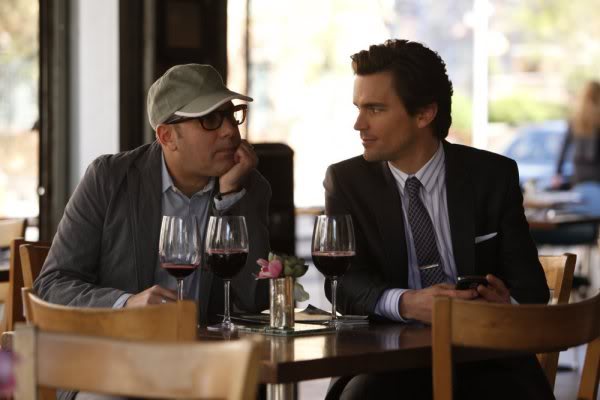 If there is a buddy on White Collar, it is Mozzie. He’s worked with Neal in the past and they interact as peers and colleagues. But as the show has progressed, Mozzie has also become something of a buddy to Peter.
If there is a buddy on White Collar, it is Mozzie. He’s worked with Neal in the past and they interact as peers and colleagues. But as the show has progressed, Mozzie has also become something of a buddy to Peter.
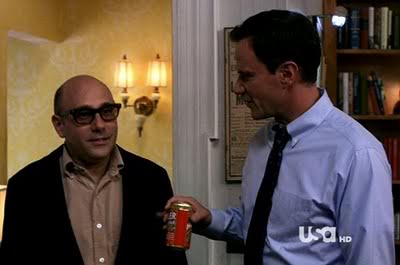 That is a relationship that Peter finds disconcerting. Mozzie does not respond to him the way Neal does. In fact, Mozzie calls him “The Suit,” something a sibling would not do going up the pecking order. Peter calls Mozzie “your little friend” to Neal (Mozzie is shorter than the other two), but he has also accepted Mozzie’s assistence in dealing with certain circumstances.
That is a relationship that Peter finds disconcerting. Mozzie does not respond to him the way Neal does. In fact, Mozzie calls him “The Suit,” something a sibling would not do going up the pecking order. Peter calls Mozzie “your little friend” to Neal (Mozzie is shorter than the other two), but he has also accepted Mozzie’s assistence in dealing with certain circumstances.
All this analysis brings me to the point for writers — when you partner up two characters, what are the finer aspects of the relationship? Are they going to be peers, even if they are Hero and Sidekick (consider Harry Potter and his friend Ron Weasley)? Or are they going to have more of a sibling relationship (such as Sherlock and Dr. Watson in the recent feature film)? The distinction between brothers and buddies points you toward different details in their interactions. (And of course, although this discussion has used all male examples, it still holds true of female characters.)
(All pictures are copyright of the various production companies, and are used here under Fair Use, for the purposes of discussion and analysis.)

Pingback: Father Knows Worst | Scribbler's Guide to Myth